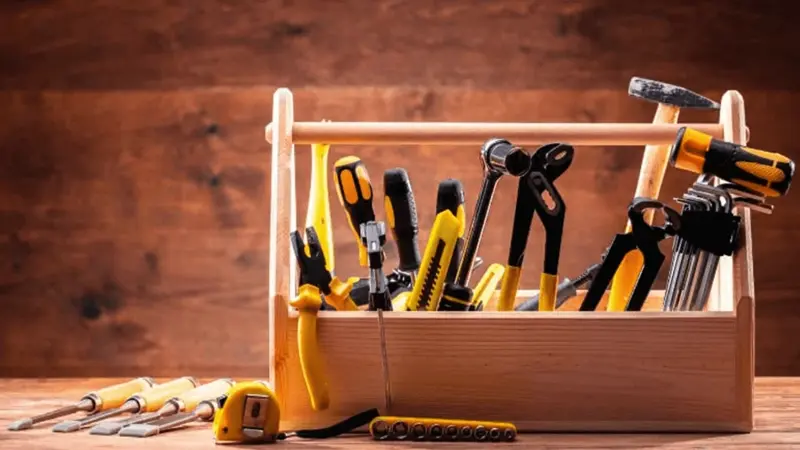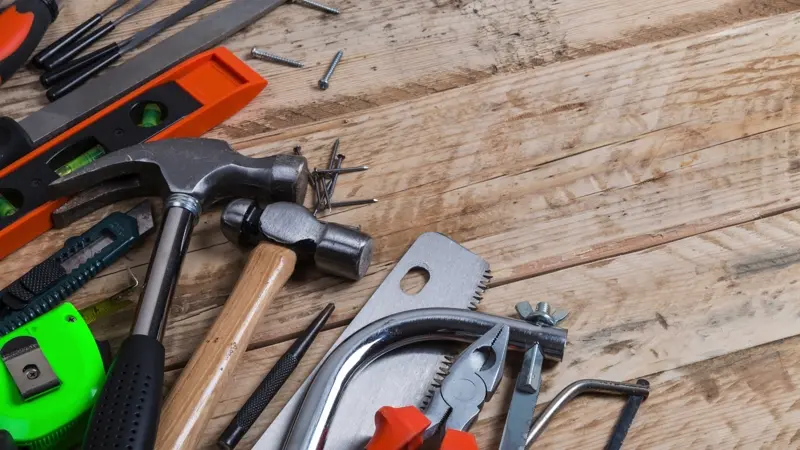With so much riding on the outcome of a job well done, it just makes sense to be prepared for anything. Thus, it’s just common sense to ensure that your toolbox contains several different tools that can easily be used in a range of situations. And while certain tools may be critical to your work, it’s always better to prepare for the worst-case scenario – this way, you can have a better idea of what you need before deciding what to use.
Table of Contents
Discover Your Perfect Toolbox Content
Before you snap your toolbox shut, take time to think about your usual projects. Whether you’re passionate about woodworking, car repairs, home renovations, or basic household upkeep, this reflection is key. Choosing your tools isn’t just about listing tasks—it’s about foresight and purpose. As you make your list, let practicality guide you; focus on tools for tasks that come up often. This way, you’ll craft a toolset that’s not just personalized, but also effective in helping you work with skill and precision.
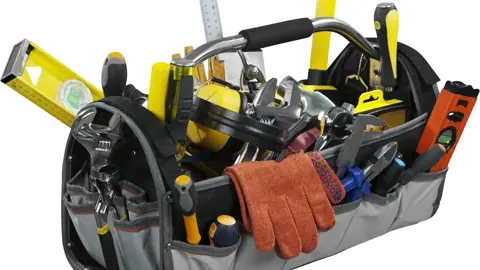
Essential Tools for Every Toolbox
Across the wide variety of tasks and projects one might tackle, a fundamental set of tools are essential. These tools are crucial for any project and should be part of everyone’s toolkit, no matter what their specific goals may be. There are certain essential tools that everyone should have, regardless of their particular needs.
1. Screwdrivers and Wrenchs
In the world of DIY, screwdrivers and wrenches are essential tools that you must have in your toolbox. These tools are essential for fixing common household appliances and equipment, and can help you save money on repairs by allowing you to do the work yourself.
While screwdrivers come in different shapes and sizes, their main purpose is to tighten and loosen screws. On the other hand, wrenches come in various forms too, but their primary aim is to tighten or loosen bolts and nuts. These two tools are a must-have when it comes to any repair project or DIY activity, and their importance cannot be overstated.
Here are the most common types in use:
- A flat head screwdriver: a common tool found in most toolboxes is a flathead screwdriver. This simple yet essential tool is used for tightening and loosening screws with a single slot on the head. The flat head screwdriver is easily recognizable with its narrow, flattened tip, which allows it to fit into tight spaces with ease. It is an integral part of every toolbox due to its versatility and usefulness in multiple types of projects.
- Phillips screwdriver In the world of tools, the Phillips screwdriver has become a staple. This versatile tool is essential for many common repairs and DIY projects around the house, and is easy for even the most novice homeowner to use. From assembling furniture to fixing loose cabinet hinges, having a Phillips screwdriver in your toolbox is a must.
- Hex keys and Torx keys are vital tools for anyone interested in DIY projects or doing mechanical work at home. These tools are designed to fit specific types of screws, making it easier to loosen or tighten them without causing any damage. While some people may think that only professionals need to use these tools, anyone can benefit from having them in their toolbox. In fact, many furniture and household items today have screws that require a specialized key, making these tools even more essential for everyday use.
- An adjustable wrench is a must-have tool for any DIY enthusiast. It is a versatile tool that can be used to tighten or loosen bolts and nuts of different sizes. Additionally, it can be adjusted to fit bolts and nuts of different shapes, making it a must-have tool for anyone working on different types of projects. With an adjustable wrench, you can save time and money by not having to switch between different sizes of wrenches.
- A pipe wrench is a tool that many people underestimate the usefulness of. It is an important wrench for any plumbing job and is also a versatile tool for other purposes. The most common use is to work with threaded pipes and fittings, but it can also be used for loosening or tightening various objects. The design includes a long handle and serrated jaws that can be adjusted to fit different sizes of pipes or fittings.
- A basin wrench is a tool used in plumbing to reach and turn mounting nuts on faucets or other plumbing valves that are otherwise impossible to reach using regular wrenches. Despite its limited uses, a basin wrench is an essential tool to have for any plumbing job. Its unique design allows for easy access to difficult-to-reach plumbing connections, which can save plumbers and DIY enthusiasts alike a significant amount of time and effort. In this next section, we will discuss the various uses of a basin wrench and how it can make plumbing tasks easier and more efficient.
2. Hammers
Hammers are some of the oldest and most versatile tools in human history. From the crude stone and bone hammers of prehistoric times to the refined steel hammers of today, this simple tool has remained a staple of the human toolbox. Whether used for construction, demolition, or crafting, there is always a need for a good hammer. In fact, you’d be hard-pressed to find a workshop or toolbox that doesn’t have at least one hammer in it.
3. handsaw
A handsaw is an important tool in any workshop. With its sharp teeth and sturdy blade, it can easily cut through wood, plastic, and even metal. Whether you’re an experienced carpenter or just starting out, a handsaw is an essential tool for making precise, clean cuts. Not only does it save time and effort compared to other tools, but it can also help prevent accidents by providing more control over the cutting process.
4. An assortment of pliers
A well-stocked toolbox should always include a variety of pliers to ensure that you’ll always have the right tool for the job.
Pincers are a versatile tool that can be used for gripping, cutting, and manipulating objects in a variety of settings. Their design allows them to be adapted for precise tasks or heavy-duty projects, making them useful for both industrial and household purposes. By utilizing pincers, individuals can improve their efficiency and accuracy in a wide range of manual tasks.
there are many different types of pliers, making it difficult to know which ones you actually need. That’s why we’ve compiled a list of the most important types of pliers to have, to help make your tool selection process easier.
- Lineman’s pliers are one of the most essential tools for any electrician or DIY professional. These pliers offer an optimal balance of strength and dexterity, thereby allowing for greater leverage and enhanced gripping capabilities. Whether you’re cutting through a thick copper wire or simply tightening a screw, lineman’s pliers are incredibly versatile and efficient tools that should be present in any toolbox. Despite their power, most lineman’s pliers are also relatively lightweight and easy to handle, ensuring that users can get the job done without fatigue or discomfort.
- Vise grips are a type of locking plier that can be used for clamping, tightening and screwing tasks. They allow for a strong and secure grip on any object, making them useful for a wide range of applications. Whether you’re a professional tradesperson or simply a DIY enthusiast, vise grips are an excellent addition to any toolbox.
- Slip joint pliers also known as channel-lock pliers, are essential tools for any professional or DIY handyman. The design of the pliers makes them versatile for a wide range of tasks such as cutting, twisting, loosening, and tightening objects in various shapes and sizes. With their rugged construction, they can endure heavy use and adverse conditions, providing numerous advantages over other types of pliers in terms of strength, durability, and flexibility. When selecting a pair of tongue and groove pliers, the key factors to consider are the quality of materials, the size and shape of the jaws, and the grip handle and ergonomics.
- Nose pliers are an essential tool for any craftsman. They come in a variety of shapes and sizes, each serving different purposes. With the right set of nose pliers, you can easily bend, twist, and shape metals and wires to your will. Whether you’re a professional jeweler, mechanic, or just an avid DIY enthusiast, a good set of nose pliers is a must-have in your toolbox.
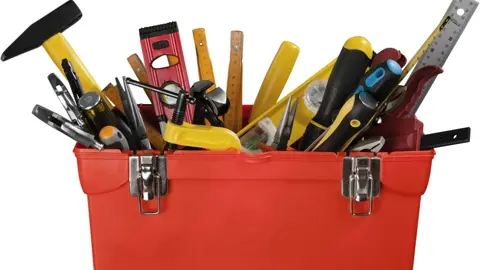
5. Cordless Impact Driver
An essential utility tool for DIY enthusiasts has always been a cordless impact driver. This tool is widely described as a versatile, powerful and compact drill and driver, ideal for drilling and manual screws which are often faced with tight areas of workspace. Its ergonomic structure makes it an ideal match for amateurs and professionals alike. However, the importance of the chuck size, battery weight, and torque variables adds a whole different dimension when it comes to heavy-duty impact drivers being carried by professionals on heavy-duty job sites.
6. Spirit Levels
A spirit level is an essential tool for most DIY enthusiasts and professionals alike. It helps to ensure that surfaces and constructions are level and plumb, which is important to avoid potential issues down the line. A common design for a spirit level is a rectangular or square-shaped body with a range of vials set into it. The more vials present, the more accurate the level, and they allow users to work on surfaces parallel to either the horizontal or vertically.
7. Tape Measure
One tool that can be incredibly useful is a tape measure. Whether you’re working on a construction site or just doing some DIY improvements at home, a tape measure can help you ensure precise measurements for a perfect fit. In addition, some tape measures have features like built-in levels or calculators, adding even more convenience to the measuring process.
8. Pick-Up Tool
Pick-up tools are immensely helpful when it comes to retrieving small objects in hard-to-reach places. They save you a lot of time and effort since you don’t have to disassemble anything to retrieve an object. Magnetic pick-up tools are ideal for retrieving small metallic objects, while claw-style tools are better for non-magnetic items. When working in tight spaces or dimly lit areas, a lighted pick-up tool can come in quite handy – making it easy to locate and retrieve those vital nuts or bolts that will have otherwise been challenging to find.
9. Headlamp
In the world of DIY project enthusiasts and professionals alike, a headlamp is one of the most valuable tools in your arsenal. With its ability to illuminate your workspace while leaving your hands free, it provides increased efficiency and precision while working on a project. This is especially true when holding tools that require both hands or working in tight, dark spaces. A headlamp also allows you to work in areas without easy access to an external light source or where bringing in outside light could be detrimental to your project.
Additional Tools
While having essential tools such as screwdrivers and wrenches may suffice in some cases, there are undoubtedly additional tools that one can add to their toolbox to enhance their overall proficiency. of these tools, such as:
Quick action clamps are an essential tool when it comes to effectively and efficiently securing workpieces during machining, welding or assembly processes.
Block Plane is one tool that shouldn’t be overlooked. This finely-tuned instrument can make a variety of cuts and is perfect for smaller projects or detailed work. Whether you need to chamfer an edge, shape a curve, or smooth a surface, the block plane can handle it all with ease.
Adjustable square is tool that offers precise angles in woodworking and metalworking. It is an essential tool for both professional woodworkers and DIY enthusiasts.
Stainless Steel Putty Knife is one useful tool that everyone should have on hand is a trusty stainless steel putty knife. Not only can it assist with spackling and patching walls, it can also come in handy for a variety of other small jobs.
a wire stripper, If you’re an electrician or you’re interested in doing electrical work on your own, a wire stripper is a tool you absolutely need in your tool kit. A wire stripper is a hand-held tool used to remove the protective coating from wires, making it easy to connect wires to terminals or other wires.
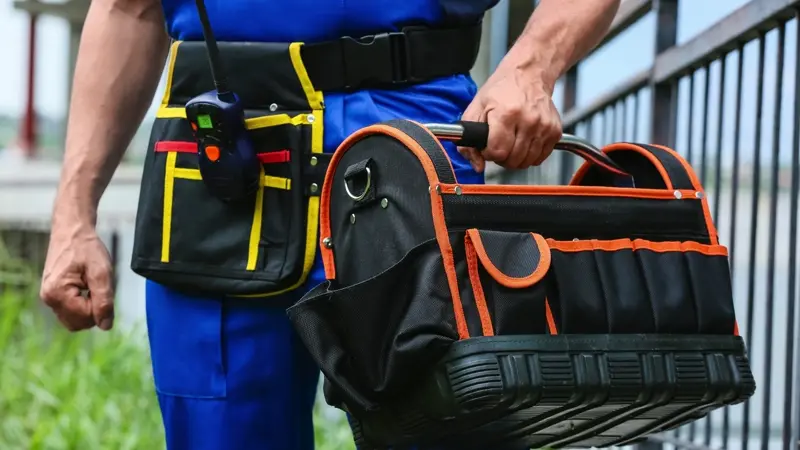
The Bottom Line
Building the perfect toolbox is less about stocking up on every tool imaginable and more about selecting the right ones that best fit your necessities. By being mindful about what you include and how you maintain those items, you’ll master the art of readiness—ensuring that whatever challenge comes your way, your balanced toolbox will be your reliable ally in getting the job done right.
